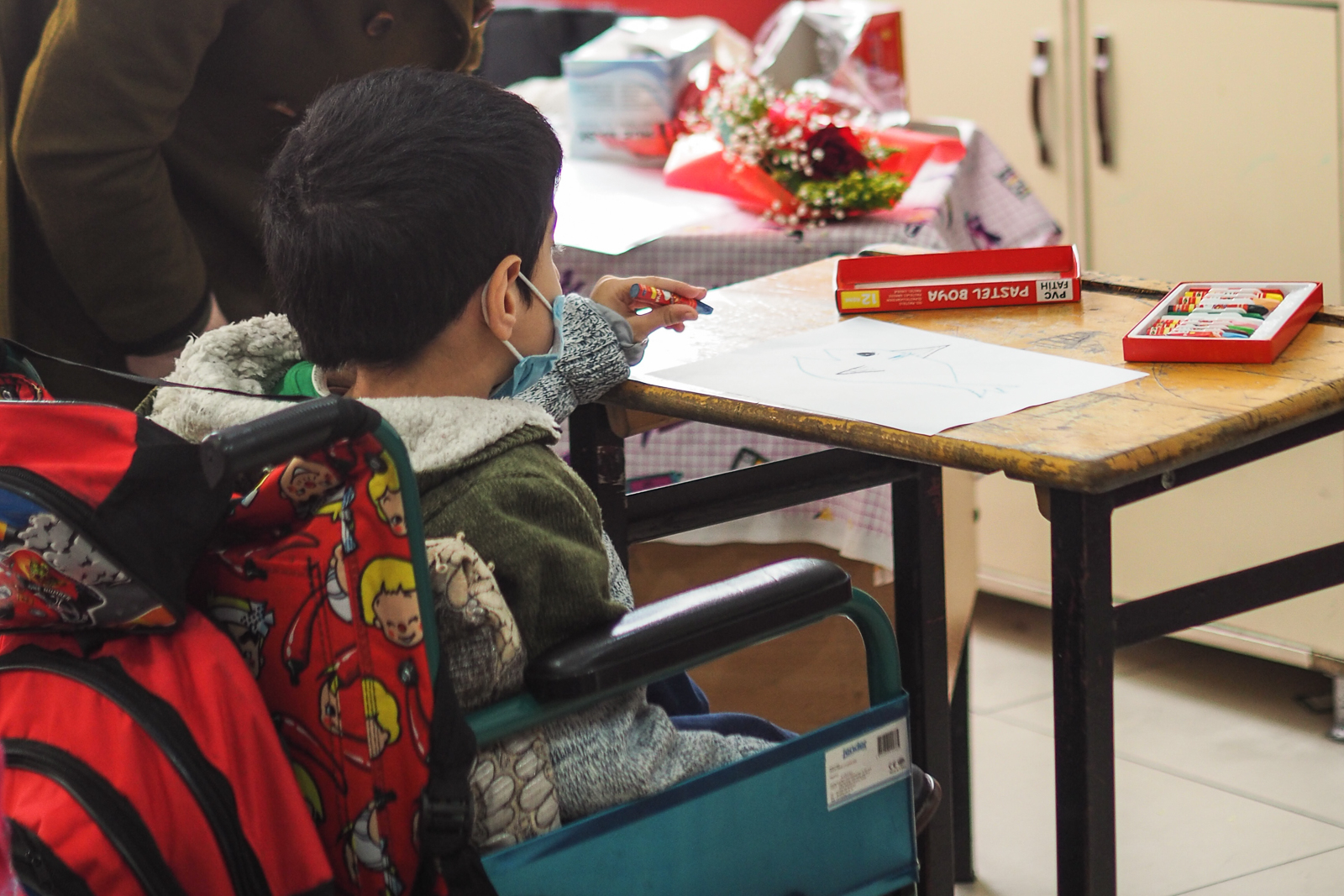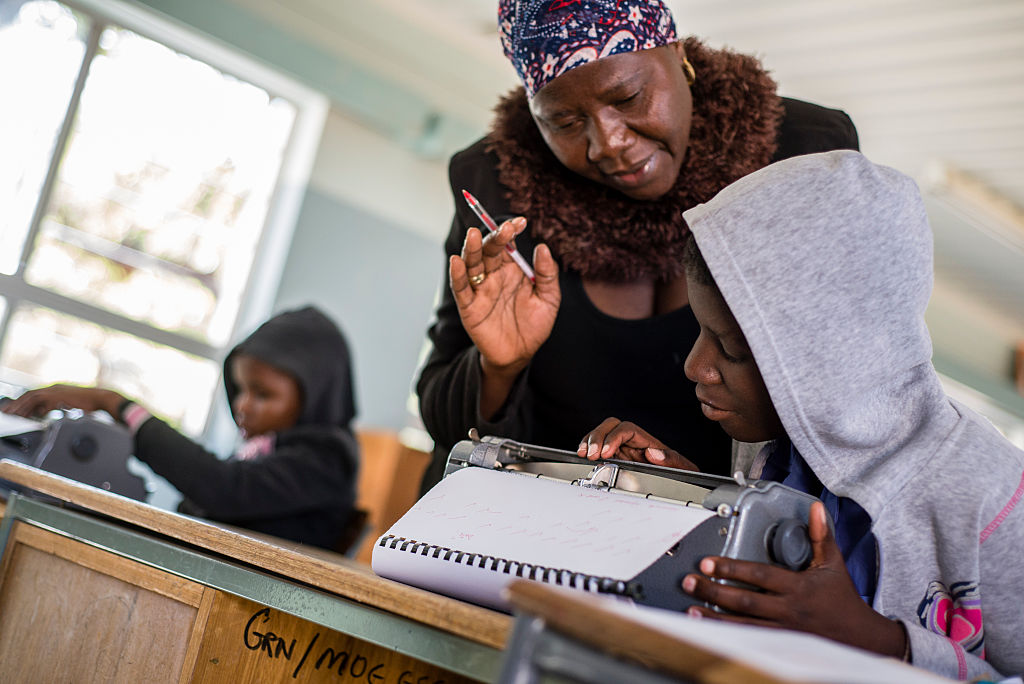
I became a special education teacher to help change the lives of marginalised children
Children with disabilities, Early childhood development, Teachers and learning
Quality and inclusive early childhood development - including pre-primary education - can deliver the right guidance and support to children with disabilities.
- On July 24, the United Kingdom government will co-host its first Global Disability Summit with the International Disability Alliance and the government of Kenya. It will bring together more than 700 delegates from governments, donors, private sector organisations, charities and organisations of persons with disabilities.
- Young children with disabilities are particularly vulnerable. In the run-up to the summit, Their News is looking at the challenges they face and what’s being done in different parts of the world to provide them with nurturing care and education.
Donna Bowman became a special education teacher because she wanted to make a difference to young children in danger of being left behind.
A mother of three, she has worked with youngsters aged from three to five for the past nine years.
“I chose to be a special education teacher because I wanted to be challenged in my teaching profession,” said Donna, from Missouri in the United States. “I also wanted to be able to make a difference with members of the population who seem to be marginalised.
“These children can face challenges physically, mentally and emotionally -and sometimes their personal safety is at risk.”
Early learning is a crucial part of nurturing care for all children under five. But around the world millions of children with disabilities are missing out – and suffering the consequences for the rest of their lives.
Quality and inclusive early childhood development – including pre-primary education – has to identify children with special needs and then deliver the right guidance and support.
That means having qualified teachers with the appropriate training to provide learning and the practical skills needed by disabled children in their daily lives.
Theirworld believes that governments and donors need to significantly scale up support for children with disabilities in their first five years – including access to, and meaningful participation in, quality pre-primary education and early learning.
As part of this, countries should increase the numbers of teachers with specialist training in inclusive education, while ensuring representation of teachers with disabilities.
Donna Bowman has worked for US Department of Defense schools in Germany and in elementary, middle and high schools in Virginia, Rhode Island and Arkansas. She now teaches in Carl Junction School District, Missouri.
“The children who really need the help are not able to come to school consistently because their parents often lack the skills to help them,” she said.
“Yet early intervention for children with special needs is critical for their ability to flourish and grow their potential. Resources are essential too.”
Alana was thrilled to be at school - she was exposed to other children, music, literature and so much more. Donna Bowman
There are about 100 million children under five with disabilities – and 80% live in developing countries. But even in developed nations, poverty and discrimination can mean young children don’t get equal chances to thrive.
A 2016 study in the United Kingdom found that nearly half of people living in poverty are disabled or live in a disabled household – and that 310,000 disabled children were living in poverty, a higher percentage than non-disabled children.
Bowman told Their News about a child who was lived long in her thoughts.
“Alana was born premature and came into this world without legs or arms,” she said. “When I met her, Alana was living with her mother and great-grandparents. She was three and a half years old.
“In order to get around her house, she rolled on the floor. The mother was not sure whether to bring her to school. I know as a teenage mother it was very confusing for her and frustrating, almost overwhelming.
“The young girl did not have a wheelchair or really any device to help move Alana around, besides carrying her. I purchased a small stroller so the little one would be off the ground and could have some mobility within the classroom.
“Alana was thrilled to be at school. She had lived her whole life in her great-grandparents’ home, rolling on her side to get from room to room.
“In school she was exposed to other children, music, literature and so much more.”
Bowman tried to help by finding a wheelchair so Alana could be in charge of her own mobility.
“This was harder than I thought,” she said. “Alana’s mother was part of an Indian tribe, so had different restrictions and funding requirements. When I approached her with the paperwork this caused a lot of anxiety.
“She chose to run away from home with Alana and Alana’s father.
“For a time, they were homeless. I contacted homeless shelters but I never found out what happened to them. Her story illustrates the complications surrounding disabled children.”
Preschool and kindergarten teachers often face challenges in getting sufficient training, supplies or support to create an inclusive classroom.
“In my school district right now, there is a real push to lower the school budget,” said Bowman.
“During my last year of teaching, the director of special education removed funding in the middle of the year for my one para-professional.
“I was told to share a para with another teacher, who had a full class of students already. This happened while I was continuing to increase my class size – and several of the new students had very severe disabilities.
“It was frustrating to teach when I did not have the needed support from the administration. But I kept on working on individual students’ needs – always trying to keep the children safe.”
Theirworld’s #5for5 campaign and our work on early childhood development is supported by the Conrad N. Hilton Foundation.
ALSO IN OUR SERIES

More news

Technology has the power to expand education for children with disabilities
